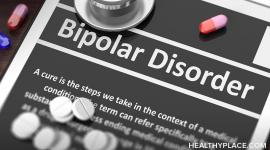Dealing with Bipolar Depression: How to Cope

A big part of bipolar disorder is depression so it’s critical to know how to deal with bipolar depression. This can feel impossible as dark feelings like pessimism, indecisiveness, and sadness, plus painful physical symptoms like when appetite and sleep changes take hold, but coping with bipolar depression is possible. Here are three major types of coping skills that can help with bipolar depression.
#1 Dealing with Bipolar Depression – Being Involved in Treatment
While medical treatment may not be a self-help bipolar depression coping skill, being actively involved in your treatment is. The first step is ensuring you have quality treatment. Just any treatment isn’t enough. You need to ensure that you get the best treatment you can which usually involves seeing someone who specializes in bipolar disorder, if at all possible. If the medical care you are receiving today isn’t helping, make sure you look at alternatives.
You can also help deal with your bipolar depression symptoms by tracking them and giving the results to your doctor. Looking for triggers that may cause or worsen bipolar depression can also help. Additionally, noting side effects can help you decide if a bipolar medication isn’t right for you.
In short, just because your doctor is prescribing the medication, it doesn’t mean you can’t have an active voice in the process.
#2. Dealing with Bipolar Depression – Crisis Planning
While no one wants a bipolar depression to escalate to a crisis point, part of learning to cope with bipolar depression is to make a plan in case it does.
Making a crisis plan for a psychiatric emergency means:
- Knowing what a crisis looks like, including what specific symptoms are likely to be present
- Knowing what to do if that crisis arises
- Knowing who to alert to a crisis
For example, a crisis plan might be:
- Suicidal rumination, self-destructive behavior, an inability to sleep and a refusal of food
- Taking the person to a hospital or even calling 9-1-1
- Contacting the person’s treatment team and loved ones as listed by the individual
Part of a crisis plan is also writing this plan down along with all diagnoses, medications and any other pertinent medical information (e.g., allergies).
#3. Dealing with Bipolar Depression – A Wellness Lifestyle
Dealing with bipolar disorder also means adopting a healthy lifestyle. This type of lifestyle can not only help if a bipolar episode hits but also help avoid its presence in the first place.
Healthy lifestyle examples include:
- Practicing your therapy tools
- Learning about your illness
- Getting treatment for any comorbid (co-occurring) disorders such as a substance use disorder
- Establishing practices in your life that you enjoy such as walking your dog or a hobby
- Keeping your life calm and peaceful and using relaxation exercises to help
- Spending time with people who support you and your efforts
There are many other components to a healthy lifestyle as well (Bipolar Natural Treatment Diet: Does Diet Affect Bipolar?).
You Can Deal with Bipolar Disorder and Bipolar Is Treatable
It’s important to remember that mood disorders like bipolar are treatable. And you can learn to deal with bipolar disorder not just through medical treatment and psychotherapy but also through skills you develop yourself as well.
APA Reference
Tracy, N.
(2021, December 28). Dealing with Bipolar Depression: How to Cope, HealthyPlace. Retrieved
on 2026, March 4 from https://www.healthyplace.com/self-help/bipolar-disorder/dealing-with-bipolar-depression-how-to-cope



